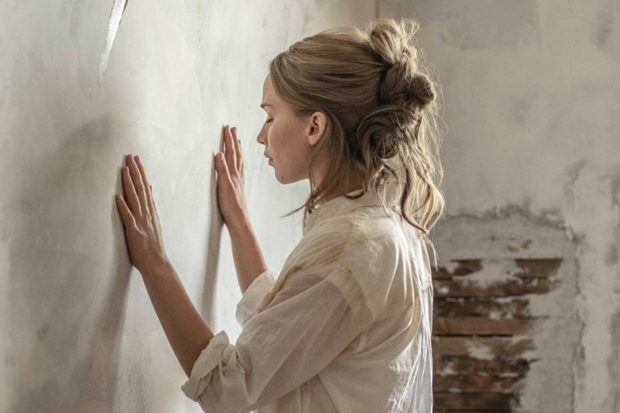 Darren Aronofsky’s cosmic horror flick goes gleefully over the top in its symbolic depiction of the tragic historical situation of women.
Darren Aronofsky’s cosmic horror flick goes gleefully over the top in its symbolic depiction of the tragic historical situation of women.
“Hell is other people.” That famous saying is from the play “No Exit” by Jean-Paul Sartre. It would also make a good tagline for Darren Aronofsky’s latest film, mother!
mother! stars Jennifer Lawrence as a young woman living in a huge house in the country with her husband, a writer who appears to be about 20 years older than she, and is played by Javier Bardem. He is currently suffering from writer’s block, and in the meantime she’s been expending a great deal of energy renovating and decorating this magnificent old house.
On the day the story opens, an unexpected visitor knocks on the door—a doctor played by Ed Harris who claims to be looking to move in somewhere nearby. The writer says he is welcome to stay at the house in the meantime, and right away his young wife is surprised and alarmed that her husband would offer such hospitality to a total stranger, and without asking her permission. It turns out that the doctor is actually a fan of the writer’s work, and has really come to meet his idol. During the night, in which he and the writer get drunk together, he gets frighteningly ill. The next day the doctor’s wife, played by Michelle Pfeiffer, suddenly shows up unannounced. She pretends to be really nice to the young wife, but everything she says is dripping with passive aggressive condescension. The behavior of these unwanted visitors becomes more and more offensive, yet the Javier Bardem character keeps making excuses for them, so the Jennifer Lawrence character’s feelings of being abandoned, insulted, and ignored are increasingly heightened. Well, this is just the beginning. More people show up in the film, in two successive waves, the second more extreme than the first, and the young wife and her house are subjected to varieties of outrage and destruction that escalate to a level of mayhem beyond anything you can imagine.
The film has stirred up some controversy. A lot of people seem to hate it, and I think the whole thing is silly. If it weren’t a big budget Hollywood film starring Jennifer Lawrence, I bet there wouldn’t be all this fuss. The mass audience nowadays is generally not used to symbolic art. At worst, they just complain that they can’t understand it. And at best, most people tend to confuse symbolism with allegory. So let me just say that if you’ve read reviews of this film that say that the wife represents this and the husband represents that, or that the film “means” such-and-such, ignore them. Yes, there are symbolic elements in mother! that have parallels in the Bible, mostly the Book of Genesis, but also the New Testament. But when a work is structured this way, it doesn’t mean that the artist is trying to dramatize the same thing that you’re assuming the symbolic framework is about. Here, for example, the film takes a point of view which is largely unrepresented in the Bible, namely a female one. Aronofsky has learned how to use symbols to resonate within the work, on subconscious levels of thought and feeling, and I can see looking back on his previous films, especially with The Fountain and Noah, that he’s been working towards this and only now has managed to achieve it.
Leaving aside the picture’s mythic echoes, I think Aronofsky is focusing on the tragic historical plight of women, both in a concrete and cosmic sense. We experience everything in the film from the young woman’s vantage point, and we see how she is relied upon, objectified, made into an inspiration for the male, degraded, manipulated, and ultimately given sole meaning as a mother, but never recognized simply as herself. In counterpoint to this, the film also depicts the absolute lunacy of human beings, their mindless cultism, malice, and self-destruction. Seen from the Jennifer Lawrence point of view, it’s a horror film. If you step back and look at it in terms of the director’s vision of human history, it’s almost a comedy—a very black comedy indeed. The film goes all the way overboard into total chaos, and I’m guessing that’s part of why some people are uncomfortable with it, but that’s exactly one of the things I like about it. So leave your preconceptions at home, and go see mother!

Bong Joon Ho’s fiendishly clever new film takes aim at the issue of class, reflected in a tale of a family of criminals invading...

Minari, the latest film from writer-director Lee Isaac Chung, tells the story of an immigrant Korean family’s struggle to make a new life in...

In 1877, the owners of a Swiss clock and watch factory constantly time their employees’ performance, while the workers organize one of the first...